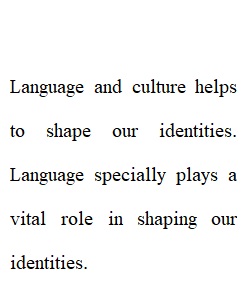


Q Prior to beginning work on this discussion forum, read “This Must Be the Place” and “Individualism as an American Cultural Value” in your course text. In addition, read the article “How Language Shapes Thought ” and the short literary works “My Name,” the first story on the webpage House on Mango Street by Sandra Cisneros: 2 Stories (Links to an external site.), and “Mother Tongue, by Amy Tan (Links to an external site.).” In “How Language Shapes Thought,” Boroditsky (2011) discusses the Sapir-Whorf hypothesis, which contends that language powerfully shapes everyday experiences and perceptions of the world. The language(s) humans speak, the theory suggests, may influence their everyday experiences in ways they are often unaware of. This week’s readings offer reflections on the significance of language in an individual’s day-to-day experience, particularly as language relates to one’s senses of individual and cultural identity. The authors suggest repeatedly that language is closely connected to culture and to history. Sometimes, when cultures and languages intersect, this intersection may present conflicts between an individual’s sense of self and that individual’s relationship to language, and between the person’s own and another culture. Choose at least two readings from this week, and reflect on the relationship between language and identity. In your initial posting, consider the following questions: How are language and identity connected in the works? Consider both individual and cultural identity. How is language depicted as a source of power on the one hand, and a cause of inner and external conflict on the other? How does language highlight and embody possible conflicts between cultures and ethnicities? To what extent does language affect (or not affect) our world views, and our experiences of ourselves and the world?
View Related Questions